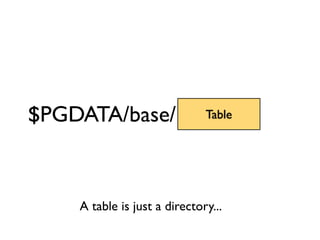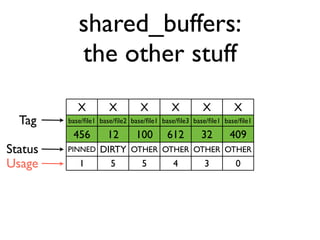Illustrated buffer cache
- 1. An illustrated guide to the buffer cache Selena Deckelmann Based on Greg Smith’s “Inside the Buffer Cache” http://www.westnet.com/∼gsmith/content/postgresql
- 2. Table Databases Table Table Databases are made of tables...
- 3. $PGDATA/base/ Table A table is just a directory...
- 4. $PGDATA/base/ Table Table Table You can have more than one table.
- 5. $PGDATA/base/ Table Table Table Made of Made o f 8K File 8K 8K File 8K 8K File 8K File 8K ... ... Up to 1 GB Files are made up of 8K blocks.* * you can change that at compile time.
- 7. shared_buffers ptr ptr ptr ptr ptr ... An array of pointers to 8K blocks (and some other stuff) shared_buffers is configured at database start. You have to restart Postgres to change it.
- 8. shared_buffers: the other stuff FREE FREE FREE FREE FREE FREE In the beginning...
- 9. shared_buffers: the other stuff FREE FREE FREE FREE FREE FREE 456 12 100 612 32 409
- 10. shared_buffers: the other stuff X X X X X X 456 12 100 612 32 409
- 11. shared_buffers: the other stuff X X X X X X Tag base/file1 base/file2 base/file1 base/file3 base/file1 base/file1 456 12 100 612 32 409
- 12. shared_buffers: the other stuff X X X X X X Tag base/file1 base/file2 base/file1 base/file3 base/file1 base/file1 456 12 100 612 32 409 Status FLAGS FLAGS FLAGS FLAGS FLAGS FLAGS
- 13. shared_buffers: the other stuff X X X X X X Tag base/file1 base/file2 base/file1 base/file3 base/file1 base/file1 456 12 100 612 32 409 Status PINNED flags flags flags flags flags { } UPDATE mytable (status) VALUES(‘my cat is the best ever’) where user = ‘selenamarie’;
- 14. shared_buffers: the other stuff X X X X X X Tag base/file1 base/file2 base/file1 base/file3 base/file1 base/file1 456 12 100 612 32 409 Status PINNED DIRTY flags flags flags flags { COMMIT; }
- 15. shared_buffers: the other stuff X X X X X X Tag base/file1 base/file2 base/file1 base/file3 base/file1 base/file1 456 12 100 612 32 409 Status PINNED DIRTY OTHER OTHER OTHER OTHER { BLAH BLAH BLAH; }
- 16. shared_buffers: the other stuff X X X X X X Tag base/file1 base/file2 base/file1 base/file3 base/file1 base/file1 456 12 100 612 32 409 Status PINNED DIRTY OTHER OTHER OTHER OTHER Usage 1 5 5 4 3 0
- 17. shared_buffers: the lifecycle X X X X X X base/file1 base/file2 base/file1 base/file3 base/file1 base/file1 456 12 100 612 32 409 PINNED DIRTY OTHER OTHER OTHER OTHER 1 5 5 4 3 0 { myPgProcess calls: BufferAlloc(‘base/file1’, 100); }
- 18. shared_buffers: the lifecycle X X X X X X base/file1 base/file2 base/file1 base/file3 base/file1 base/file1 456 12 100 612 32 409 PINNED DIRTY PINNED OTHER OTHER OTHER 1 5 5 4 3 0 { myPgProcess calls: BufferAlloc(‘base/file1’, 100); }
- 19. shared_buffers: the lifecycle X X X X X X base/file1 base/file2 base/file1 base/file3 base/file1 base/file1 456 12 100 612 32 409 PINNED DIRTY OTHER OTHER OTHER OTHER 1 5 5 4 3 0 { myPgProcess calls: BufferAlloc(‘base/file1’, 101); }
- 20. shared_buffers: the lifecycle Who’s it gonna be? X X X X X X base/file1 base/file2 base/file1 base/file3 base/file1 base/file1 456 12 100 612 32 409 PINNED DIRTY OTHER OTHER OTHER OTHER 1 5 5 4 3 0 Eviction! { myPgProcess calls: BufferAlloc(‘base/file1’, 101); }
- 21. shared_buffers: the lifecycle Who’s it gonna be? X X X X X X base/file1 base/file2 base/file1 base/file3 base/file1 base/file1 456 12 100 612 32 409 PINNED DIRTY OTHER OTHER OTHER OTHER 0 5 5 4 3 0 Scan the cache! Usage != 0, so decrement. { myPgProcess calls: BufferAlloc(‘base/file1’, 101); }
- 22. shared_buffers: the lifecycle Who’s it gonna be? X X X X X X base/file1 base/file2 base/file1 base/file3 base/file1 base/file1 Usage == 0, 456 12 100 612 32 409 Goodbye! PINNED DIRTY OTHER OTHER OTHER OTHER 0 4 4 3 2 0 { myPgProcess calls: BufferAlloc(‘base/file1’, 101); }
- 23. shared_buffers: the lifecycle Who’s it gonna be? X X X X X X base/file1 base/file2 base/file1 base/file3 base/file1 base/file1 456 12 100 612 32 101 PINNED DIRTY OTHER OTHER OTHER PINNED 0 4 4 3 2 1 { myPgProcess calls: BufferAlloc(‘base/file1’, 101); }
- 24. shared_buffers: optimizations* X X X X X X X ... base/file1 base/file2 base/file1 base/file3 base/file1 base/file1 base/file2 ... 456 12 100 612 32 101 891 ... PINNED DIRTY OTHER OTHER OTHER PINNED OTHER ... 0 4 4 3 2 0 1 ... { } Result is greater than: SELECT pg_relation_size(‘mytable’); shared_buffers/4 VACUUM mytable; * Version 8.3 and later
- 25. shared_buffers: optimizations X X X X X X X ... base/file1 base/file2 base/file1 base/file3 base/file1 base/file1 base/file2 ... 456 12 100 612 32 101 891 ... PINNED DIRTY OTHER OTHER OTHER PINNED OTHER ... 0 4 4 3 2 0 1 ... 256K ring buffer allocated! { SELECT pg_relation_size(‘mytable’); VACUUM mytable; } * Version 8.3 and later
- 26. shared_buffers: optimizations VACUUM Safe during OVERSIMPLIFICATION WARNING! X X X X X X X ... base/file1 base/file2 base/file1 base/file3 base/file1 base/file1 base/file2 ... 456 12 100 612 32 101 891 ... PINNED DIRTY OTHER OTHER OTHER PINNED OTHER ... 0 4 4 3 2 0 1 ... 256K ring buffer allocated! { SELECT pg_relation_size(‘mytable’); VACUUM mytable; } * Version 8.3 and later


























